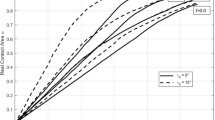Abstract
The main purpose of this paper is to investigate the variation mechanism of tribological size effect in meso-/micro-forming processes. The effects of specimen size on friction behavior in meso-/micro-forming were investigated through the pure copper upsetting experiments without lubricant. It reveals that the friction coefficient on contact surface is getting smaller with the decreasing of specimen size. Then, the influence mechanisms of specimen size on friction behavior were studied by the combination of experimental and numerical methods. It indicates that as the specimen size decreases, the reducing friction coefficient is caused by the decreasing of normal pressure on contact surface in meso-/micro-forming processes without lubricant. The investigation results are very useful for predicting friction behavior in meso-/micro-forming processes without lubricant.














Similar content being viewed by others
Abbreviations
- A :
-
Contact surface area of deformed specimen
- A r :
-
Actual contact area of deformed specimen
- D :
-
Specimen diameter
- F n :
-
Forming force
- k :
-
Shear yield strength
- m c :
-
Shear film strength coefficient
- n :
-
Strain hardening exponent
- p :
-
Contact normal pressure
- p ave :
-
Average normal pressure
- R T :
-
Top radius of deformed specimen
- R M :
-
Largest radius of deformed specimen
- σ 0 :
-
Initial yield strength
- σ :
-
Yield strength of material
- α :
-
Real contact ratio (α = Ar/A)
- τ :
-
Friction stress
- μ :
-
Friction coefficient
- θ :
-
Shape parameter
- ΔH :
-
Specimen height reduction
- H :
-
Initial specimen height
- ΔH/H :
-
Height reduction ratio
References
Luo L, Jiang ZY, Wei DB (2017) Influences of micro-friction on surface finish in micro deep drawing of SUS304 cups. Wear 374-375:36–45
Venkatesha V, Swaina N, Srinivasa G, Kumara P, Barshiliaa HC (2017) Review on the machining characteristics and research prospects of conventional microscale machining operations. Mater Manuf Process 32(3):235–262
Fu MW, Chan WL (2012) A review on the state-of-the-art microforming technologies. Int J Adv Manuf Technol 67(9–12):2411–2437
Meng B, Fu MW (2015) Size effect on deformation behavior and ductile fracture in micro-forming of pure copper sheets considering free surface roughening. Mater Des 83:400–412
Rajenthirakumar D, Sridhar R, Abenethiri R, Kartik R, Bagri D (2015) Experimental investigations of grain size effects in forward microextrusion. Int J Adv Manuf Technol 85:2257–2264
Xu ZT, Peng LF, Bao EZ (2018) Size effect affected spring-back in micro/meso scale bending process: experiments and numerical modeling. J Mater Process Technol 252:407–420
Kim HS (2014) Determination of the tribological size effects in micro-forming through the scaled upsetting tests of disks. Int J Adv Manuf Technol 75(9–12):1253–1261
Wang CJ, Guo B, Shan DB, Zhang MM, Bai XM (2014) Tribological behaviors in micro-forming considering microscopically trapped lubricant at contact interface. Int J Adv Manuf Technol 71(9–12):2083–2090
Chan WL, Fu MW, Yang B (2011) Study of size effect in micro-extrusion process of pure copper. Mater Des 32(7):3772–3782
Engel U (2006) Tribology in micro-forming. Wear 260(3):265–273
Krishnan N, Cao J, Dohda K (2007) Study of the size effects on friction conditions in micro-extrusion-part I: micro-extrusion experiments and analysis. J Manuf Sci Eng 129(4):669–676
Han JJ, Zheng W, Wang GC, Yu MZ (2018) Experimental study on size effect of dry friction in meso/micro-upsetting process. Int J Adv Manuf Technol 95(1–4):1127–1133
Guo B, Gong F, Wang CJ, Shan DB (2009) Flow stress and tribology size effects in scaled down cylinder compression. Trans Nonferrous Metals Soc China 19(2):516–520
Vollertsen F, Hu ZY (2008) Determination of size-dependent friction functions in sheet metal forming with respect to the distribution of the contact pressure. Prod Eng 2(4):345–350
Peng LF, Lai XM, Lee HJ, Song JH, Ni J (2010) Friction behavior modeling and analysis in micro/meso scale metal forming process. Mater Des 31(4):1953–1961
Kim HS (2015) A quantitative study of the tribological size effect in micro-forming with a multi-region FEA model. Tribol Int 90:104–112
Wang CJ, Wang CJ, Xu J, Zhang P, Shan DB, Guo B (2015) Plastic deformation size effects in micro-compression of pure nickel with a few grains across diameter. Mater Sci Eng A 636:352–360
Bay N (1987) Friction stress and normal stress in bulk metal-forming processes. J Mech Work Technol 14(2):203–223
Nellemann T, Bay N, Wanheim T (1977) Real area of contact and friction stress-the role of trapped lubricant. Wear 43(1):45–53
Fang Z, Jiang ZY, Wang XG, Zhou CL, Wei DB, Liu XH (2015) Grain size effect of thickness/average grain size on mechanical behaviour, fracture mechanism and constitutive model for phosphor bronze foil. Int J Adv Manuf Technol 79:1905–1914
Funding
This study was supported by the National Natural Science Foundation of China, No. 51505256 and No. 51775311.
Author information
Authors and Affiliations
Corresponding authors
Additional information
Publisher’s note
Springer Nature remains neutral with regard to jurisdictional claims in published maps and institutional affiliations.
Rights and permissions
About this article
Cite this article
Han, J., Lin, Y., Zheng, W. et al. Experimental and numerical investigations on size effect of friction in meso-/micro-forming without lubricant. Int J Adv Manuf Technol 106, 4869–4877 (2020). https://doi.org/10.1007/s00170-020-04959-x
Received:
Accepted:
Published:
Issue Date:
DOI: https://doi.org/10.1007/s00170-020-04959-x



